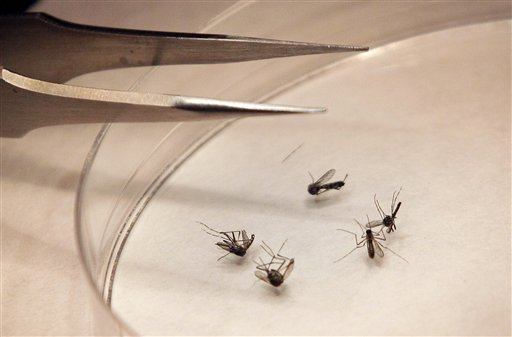West Nile virus has been found in a mosquito sample from Standish.
The monitoring pool in which the disease was detected is a few miles northwest of Gorham, where the virus was pinpointed and confirmed eight days ago.
The virus, transmitted by infected mosquitoes, was discovered in a surveillance pool in a densely wooded area between Route 35 and the northeast edge of Sebago Lake, said Standish Town Manager Gordon Billington.
He was informed of the finding Thursday by the state Center for Disease Control and Prevention, which posted a notification on its website.
The exact location of the infected mosquito sample was not disclosed by state officials, who continue to monitor for the virus throughout Maine.
It is south of Saint Joseph’s College, Billington said, and the area has light residential development. He said he expects more infected mosquitoes will be detected in the Sebago Lake region.
Billington said there has been no discussion of using pesticides in Standish to control the mosquito population, and he doesn’t expect any.
There has been considerable debate among school officials, parents, activists and pesticide applicators about the use and efficacy of pesticide poisons to control West Nile virus, which has not spread to humans in Maine.
West Nile virus was found earlier in August at a mosquito-surveillance site in Lebanon, on the New Hampshire border in York County. School officials in the town of about 4,000 residents ordered preventive spraying of a botanical pesticide on the edges of two elementary school properties.
The disease has been detected and spread to humans in Massachusetts and New Hampshire, and pesticides have been more widely used in communities in those states. The total number of cases of West Nile virus has exceeded 40 nationwide, most in Texas and other Southern states.
West Nile virus is transmitted by the bite of an infected mosquito. It can cause illness in birds, humans and other mammals. Although the disease can be fatal, many people who are infected show no symptoms and might never know they were infected, say officials for the state CDC.
Symptoms of the virus include headache, high fever, altered mental state, tremors, convulsions and, rarely, paralysis. It can also cause meningitis, an inflammation of the protective membranes covering the brain and spinal cord, or encephalitis, which involves irritation and swelling of the brain.
There is no specific treatment for West Nile virus, so state and town health officials have urged residents to do all they can to avoid exposure to mosquitoes.
Staff Writer North Cairn can be contacted at 791-6325 or at:
ncairn@mainetoday.com
Send questions/comments to the editors.


